Is your jaw causing you pain when chewing, yawning, or opening your mouth? Asking yourself ‘why does my jaw hurt’? There could be various reasons why you are suffering discomfort with your jaw. Let’s see if we can help!
There are a number of factors that contribute to jaw pain. Oftentimes, jaw pain is caused by muscle tightness, spasm or weakness. Typically, muscle tightness, spasm or weakness do not occur on their own. Rather, they are provoked and caused by something from elsewhere in the body.
Maybe you’re asking yourself, why does my jaw hurt on one side, or why does my ear hurt when I chew? Read on to find out how we can help you.
So What Causes The Muscle Tightness, Spasm And/Or Weakness Of The Jaw?
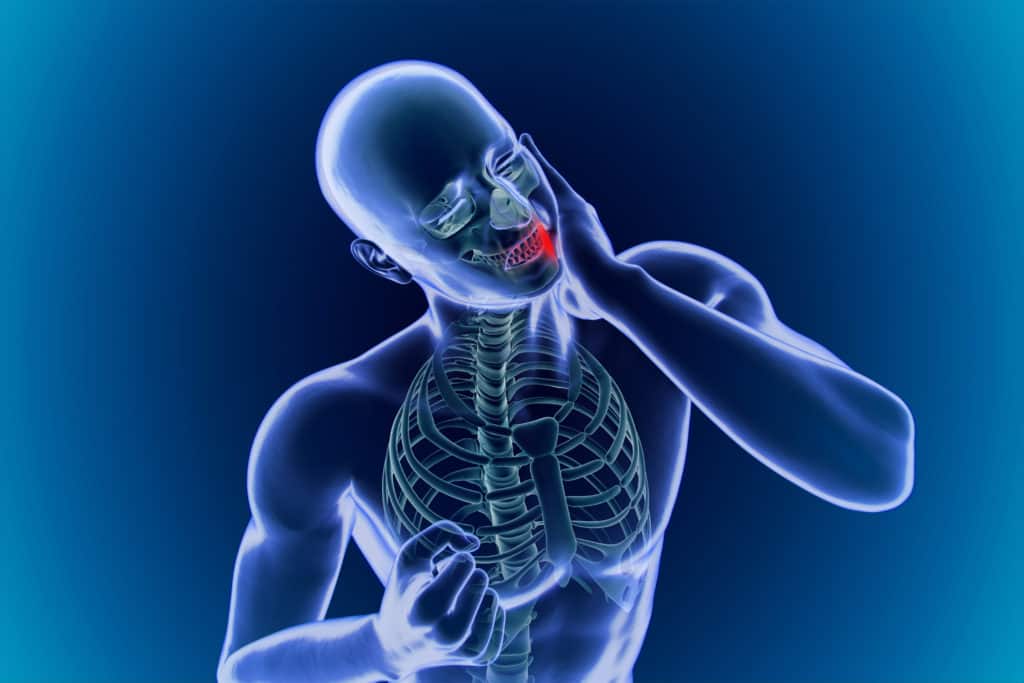
The jawbone fits together with the skull forming a hinge joint. This hinge joint can be “pulled” out of position, which can cause the jaw to open unevenly (one side of the jaw opens further/faster than the other side).
When this occurs, this can cause irritation of the joint surfaces, which results in pain just below the inside of the ear, which is where the jaw bones fit together – this joint is known as the Temporomandibular Joint (TMJ).
Another big contributing factor to jaw pain is poor posture, such as slouching when you sit. You may be wondering how poor posture could possibly be contributing to your jaw pain. Let’s explain.
Well, when you sit in a slouched position, your upper and lower back are rounded and your shoulder blades roll forward away from each other. In addition, your head “juts” forward.
As a result; slouching, rounded shoulders and forward head position place uneven and abnormal pressure on the jaw since the muscles that attach to the jaw are not working together evenly, which then causes irritation of the jaw joints.
In turn, this irritation of the jaw and it’s joints causes inflammation around the jaw, which then leads to muscle spasm and cramping as well as pain, and popping at the attachment of the jaw. Oftentimes, headaches located in the back of the head also accompany the jaw pain as well.
So How Can I Fix This?
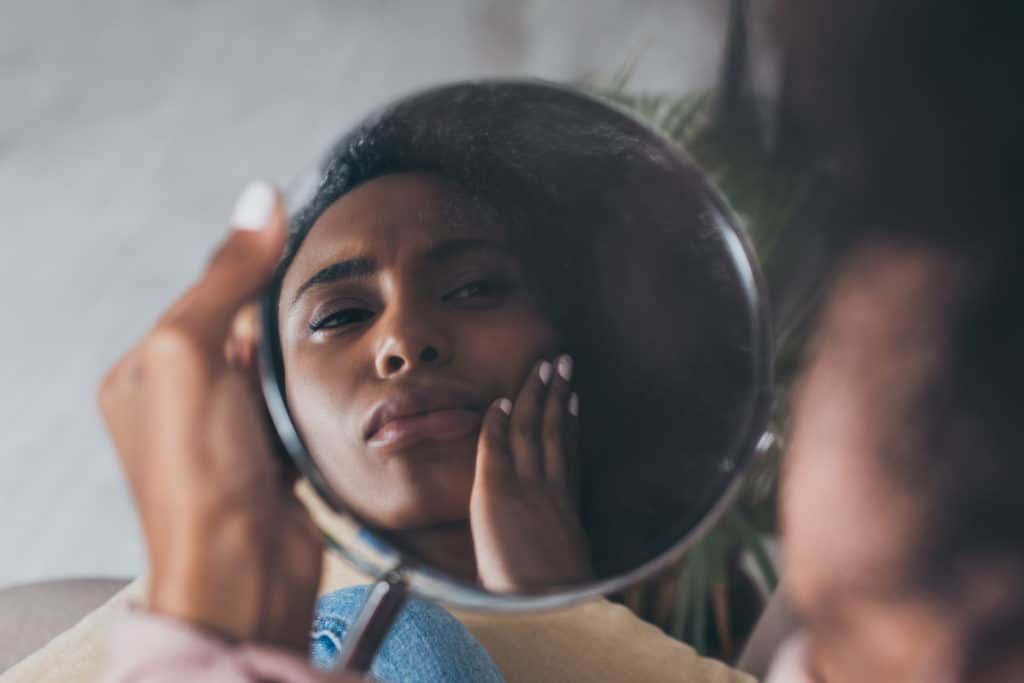
Your jaw needs to be assessed to ensure that the left and right sides of the jaw are opening equally and the joints of the jaw are functioning correctly.
You need to be instructed in the proper exercises and stretches in order to reverse the effects of poor posture.
You need to be instructed in a specific set of jaw exercises, which help you to realign your jaw in a neutral position. In addition, you may need to wear a mouthguard.
What About TMJ Dysfunction (TMD)?
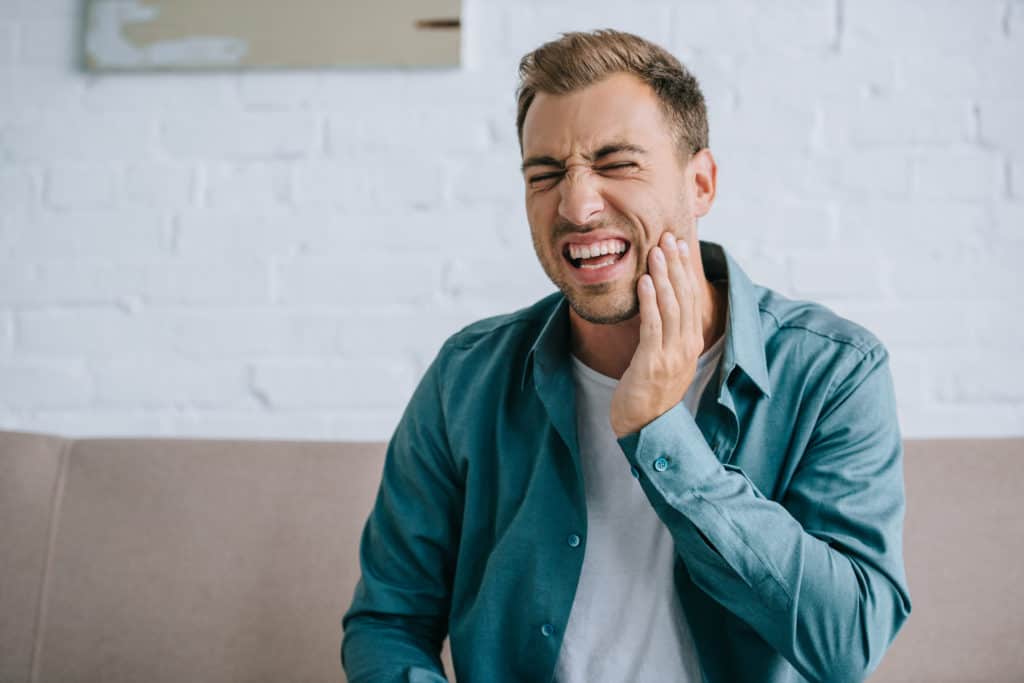
As mentioned above, the TMJ (Temporomandibular Joint) is the joint that connects the upper and lower jaws. You can feel your TMJ joint just by your ear upon opening and closing your jaw. If you have pain in this joint, then it could explain your issues with yawning, chewing, or speaking.
There are three main symptoms that could point to TMJ Dysfunction – restricted jaw movement, joint noise (or a popping sensation), and facial pain.
As a doctor may explain, chewing uses the muscles and joints between the mandible (lower jaw) and the front section from the base of the skull – referred to as the temporal bone. What they may not explain is that TMD isn’t usually a serious condition.
However, that’s easy for us to say – you are the one in pain. And that pain can affect your quality of life. Nobody wants to feel uncomfortable or stressed when eating, drinking, or talking.
What’s Caused My TMJ Dysfunction And Jaw Pain?

There are various different factors that could cause TMJ Dysfunction and jaw pain. While specific conditions – such as gout, fibromyalgia or rheumatoid arthritis – can be associated with TMD, the most common causes are often less dramatic.
One of the most frequent actions that cause jaw pain? Muscles. Over using your jaw through clenching or grinding teeth (whether through stress or during sleep – known as Bruxism) puts pressure on the joint. This can lead to wear and tear on the joint, referred to as osteoarthritis.
Many of us grind our teeth inadvertently when feeling stressed. Not only can this cause osteoarthritis, but it can develop into extreme dental pain (and expense) when wearing the teeth down. Your joint pain could be a result of a dental infection, too. We all have different levels of pain threshold. So best to get yourself checked out.
You may have suffered a joint injury and not recovered properly after a traumatic facial injury, or not fully healed after surgery. Your TMD joint may have changed post-surgery to allow too much flexibility (known as hypermobility) or too little movement (known as hypomobility).
You could have developed malocclusion, where you have an uneven bite. This usually stems from dental surgery for new fillings and dental crowns. If you’ve recently started using new dentures, then this could also be your cause of malocclusion.
We also need to take your lifestyle into account. For instance, do you sit for long stretches at your desk without a break? Are you sitting properly during this time? If you are slouching, then posture will need to be addressed to ensure your muscles aren’t causing your jaw pain. Physical Therapy remains one of the greatest ways to help regain your posture.
Can I Do Anything To Relieve The Pain At Home?
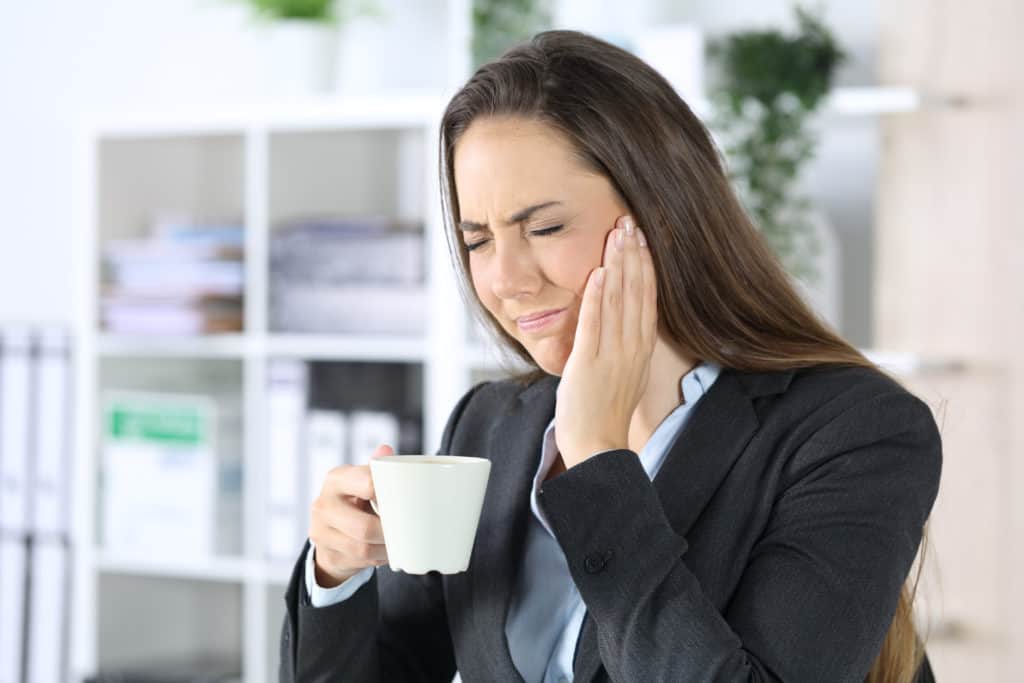
Regardless of what is causing your jaw pain, there’s an imbalance in your muscles. You can help yourself by undertaking a few ‘home remedies’. Although, we should state that these actions won’t cure your pain, but they will help in the short term.
We’d advise you to get in touch with us for a physical therapy session for a long term solution. We can also advise on gentle jaw stretches that should exercise the muscles and your TMJ.
Try to avoid chewing excess gum and don’t put duress on your joint with tough foods. Opt for softer meals and try to avoid opening your jaw wide until any pain settles. If the pain lingers, gently massage the muscles that surround the joint. This can help to relax the tension and relieve stress.
Also try not to clench your teeth for extended periods of time and don’t rest your chin on your hand. If you do any of these things and the pain builds, then you can try applying a heat pack to relax the muscles. If you are struggling with swelling (it can happen) then a cold compress can reduce your pain.
How Do I Know It’s Definitely TMJ Dysfunction?
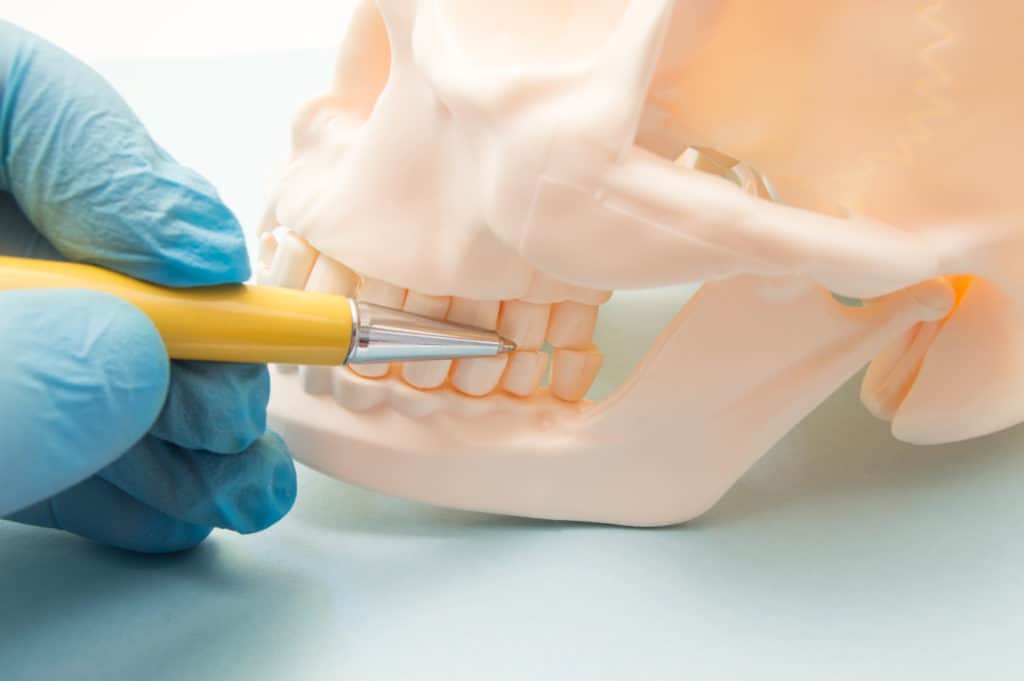
Check your symptoms against these factors. If you find any of these apply, then get in touch with your physical therapist. They will be able to help and steer you clear of dependency on painkillers and drugs.
Firstly, if you have a tenderness and painful sensation when eating, chewing, talking, or yawning then you’ve certainly got an issue with your jaw and surrounding muscles. Especially if that pain is located just by your ear, across your face, neck, or in your ear.
If you feel sudden jaw pain when opening your mouth, or suffer from restricted movement and a feeling that your jaw is ‘stuck’. You may feel like your jaw is locked. You may also hear uncomfortable clicking, popping, or grinding noises when chewing.
Side effects of this jaw pain can include headaches, tinnitus (white noise in your ear), ear ache, neck pain, shoulder pain, and a blocked feeling in your ear.
Pain in your teeth and gums can occur due to excessive grinding of the jaw, which can lead into difficulty sleeping and maintaining weight.
Get In Touch With Us!
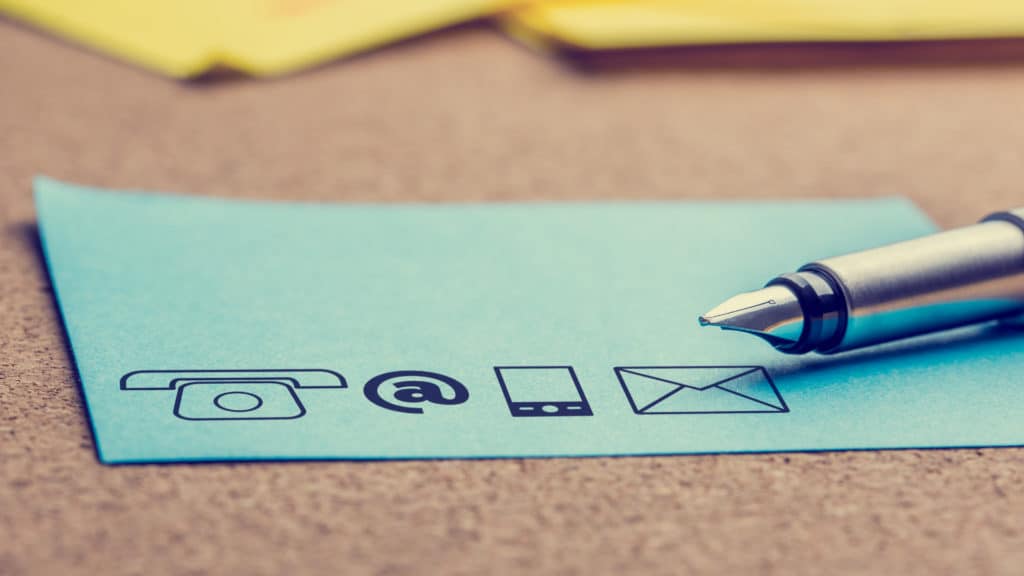
Don’t put up with pain as your new normal. You don’t have to live like that. People often try to adapt to pain as a constant in their life when they feel nothing can be done about it. However, there is a way out. You don’t need to suffer the claustrophobia of close horizons.
Physical therapy is your most effective treatment procedure for regaining normality. We can welcome you into the Cardin & Miller Physical Therapy family and start to change your life for the better.
At Cardin & Miller Physical Therapy, we help people. We specialise in helping people in their 40’s, 50’s and 60’s get back to living the life that they deserve. A life not dictated to them via the pharmaceutical invoice. A life that’s not interrupted by time spent in the doctor’s office. A life that is free from pain and surgery spoiling the party!
We can offer you the opportunity to schedule a free phone consultation with one of our expert physical therapists, to talk you through what we can do for you. You can also apply for a one-on-one screening – absolutely free!
Like the sound of that? Think we can help you? Get in touch with us!
We have physical therapy clinics in Harrisburg, Mechanicsburg, and Carlisle. Each clinic has the ability to help you find effective jaw pain relief, and help guide you to ensure that your jaw pain doesn’t return.
You can find out more through our contact page. We look forward to hearing from you and assisting you!



